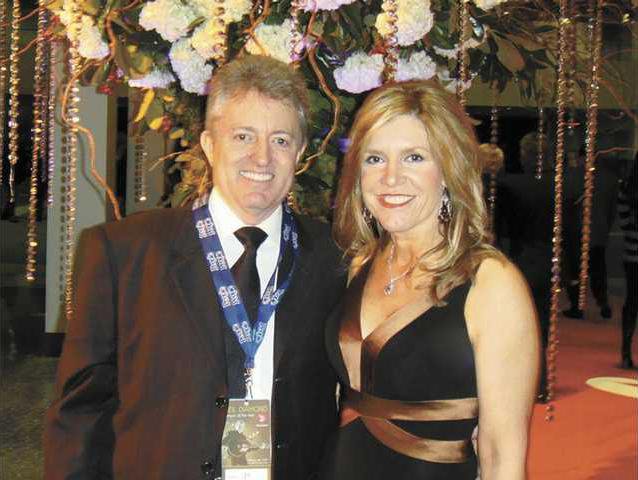For the estimated 19 million Americans who will tune in to CBS for the 52nd Annual Grammy Awards on Jan. 31, the star-studded event offers an up close and personal glimpse of the most prized musicians in our country. But for a local Statesboro couple, the Grammy Awards affords an opportunity for hands-on service and the chance to give back while helping others.
For the past seven years, Willingway Hospital CEO Jimmy Mooney and his wife Robbin have traveled to the Staples Center in Los Angeles to help host the Grammy MusiCares Safe Harbor Room, a non-profit arm of the Grammy Awards. MusiCares established its first Safe Harbor Room backstage at the 1997 Grammy telecast.
Harold Owens, senior director of Musi Cares, invited the Mooneys to the show to volunteer.
"They've been great folks to have in the room," Owens said. "There are a lot of triggers and temptations that are associated with producing the Grammys; and the Mooneys have opened their hearts to help the artists and crew."
"Usually, six to seven people volunteer in the hospitality room where food and non-alcoholic beverages are available to musicians, stage hands, producers, crew, talent and managers," Jimmy Mooney said.
The Mooneys will travel to Los Angeles five days before the event and are available during rehearsals and set-up as well.
"During pre-production, it's very high stress for the producers and crew setting up the show; and there are a lot of special events where alcohol is available," Robbin Mooney said. "This room provides a support system to artists and crew members and a safe place to hang out and relax without the alcohol."
In addition, the spacious suite, which is above the stage level and is open to the arena, provides ample room for the group to have 12-step support meetings during the day.
People new to sobriety also benefit from the room.
"They come in full of gratitude that there's a suite like this where they can get away from the pressures of the show," Robbin Mooney said.
The Mooneys agree their job at the Grammy's is a great responsibility, but it also allows the couple to rub shoulders with some of the most incredible talent on earth. Jimmy and Robbin, however, say the support network of old friends is truly what that provides the wow factor for them.
"Each January, we get to reconnect with the same people and over the years these friendships and relationships have come to mean a lot to us," Jimmy Mooney said.
People have even attained sobriety through this safe room. Jimmy Mooney shared the story of a musician nominated for a Grammy who came to the Safe Harbor room strung out on methadone.
"He was taking methadone to control his heroin addiction and this man had spent two years trying to find a treatment center to help him get off the methadone. We brought him to Willingway and he's been sober five years now and is chemical free," he said. "These experiences are what really make our time at the Grammys rewarding."
In addition to the Grammy Awards, the couple also has volunteered with MusiCares at the Country Music Awards, Academy of Country Music Awards, Latin Grammy Awards, Native American Music Awards and the Crossroads Guitar Festival. Beyond the entertainment industry, Willingway has developed business relationships across the country with highly diverse referral sources in its nearly half century of providing treatment for alcoholism and drug addiction. Jimmy and Robbin as well as Dr. Bobby Mooney, Dr. Robert Bryan and Dr. Al Mooney routinely crisscross the country to attend and serve as speakers at approximately 25 addiction and psychotherapy conferences annually. In addition, a marketing staff which includes a west coast marketing veteran based in Oregon and two veteran marketing representatives in the southeast round out the hospital's marketing department.
Approximately, 35 to 40 percent of Willingway's patients are referred from former patients of the hospital. Therapists and interventionists also supply a steady stream of patients to the 40-bed hospital.
Owens refers patients to Willingway who may need to get away from "big city" treatment centers into a smaller, more contained environment. He finds the rural, picturesque setting beneficial to successful treatment.
"Willingway offers top notch treatment. There's only a small community of providers that offer this caliber of care in the country and we deeply respect Willingway and its history," Owens said. "Willingway's continuing legacy to the recovering community nationally is without parallel."
Grammys not just awards for Willingway


Sign up for the Herald's free e-newsletter